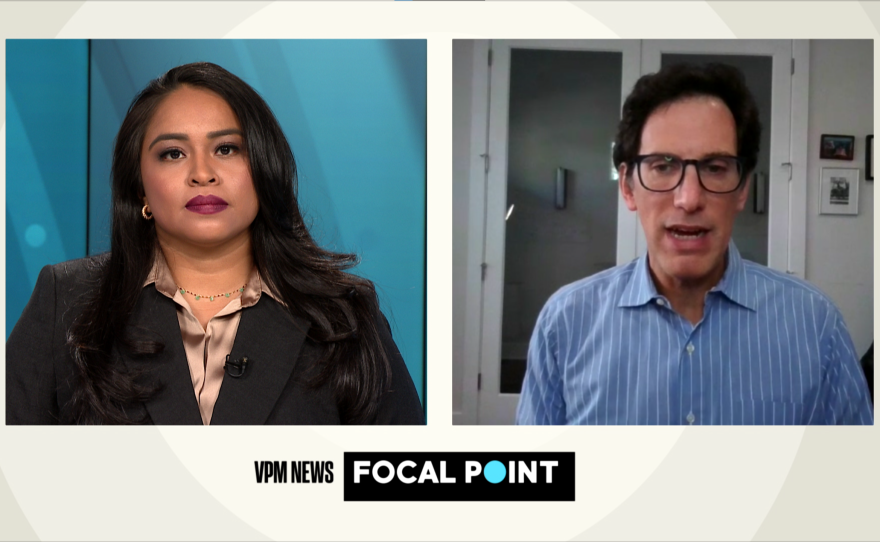TRANSCRIPT OF VIDEO
KERYIS MANZANARES: Now we turn back to the Israel-Hamas War with our guest Ariel Ahram who is a Professor and Chair of the Government and International Affairs Program at Virginia Tech. His most recent book is "War and Conflict in the Middle East and North Africa," where he explores the causes for fighting in that part of the world. Thank you for joining us. We'd like to get started with where we are right now in the Israel-Hamas War. What's been happening this week?
ARIEL AHRAM: On the military front, Israel is accelerating its ground assault and ramping up aerial and artillery attacks against Hamas strongholds in Gaza. Hamas and Palestinian Islamic Jihad are continuing to launch rockets at Israeli cities. Meanwhile, the humanitarian situation in Gaza is worsening by the hour. Israeli attacks have pulverized department buildings, hospitals, and other vital infrastructure. At least 8,000 have died in Gaza in the last three weeks. There are calls in Europe and the Islamic world for Israel to adopt a cease fire. A small number of wounded Palestinians and those holding foreign passports are being allowed to leave Gaza for Egypt. The U.S. remains Israel's key ally and supporter but has become noticeably wary of escalation and is putting pressure on Israel for restraint.
What sparked this round of violence?
This round of terrible violence began on Oct. 7 when Hamas launched a surprise attack from Gaza into Southern Israel. Hamas fighters targeted both Israeli military bases and civilian towns. They killed over 1,200 and took 200 hostages, including citizens of Israel, the U.S., Britain, France, Germany, Thailand, and elsewhere.
How do we see the weaponization of resources and humanitarian aid in this war?
Overall, neither Israel nor Hamas have shown a great concern for civilian harm despite the horrifying conditions unfolding in Gaza. The rollout of humanitarian aid in Gaza is at this point far below what civilians need to survive. This delay has a number of causes. First, Israel insists that all humanitarian aid be inspected prior to arrival in order to prevent smuggled weapons from reaching Hamas. This really hurts Gaza civilians by throttling aid distribution. Meanwhile, Israeli strikes are destroying the infrastructure that Gazans rely on for healthcare, electricity, and food. Secondly, Hamas for its part closely controls the distribution of aid within Gaza, both aid coming overland through official channels and materials smuggled through tunnels via Egypt. Hamas uses its economic power to reward loyal constituencies and punish dissenters within Gaza. Hamas has also blocked people from being able to flee combat areas around Gaza City, trapping civilians to create a human shield. Thirdly, Egypt is hesitant to accept Palestinian refugees in its territory, in part because it too fears Hamas as a security threat. Egypt only recently opened the border crossing between Gaza and Egypt to a small number of evacuees and is helping Israel monitor the flow of aid into the territory.
This is a very complicated issue, but if we were to boil it down, what is this conflict about and what are the origins?
There's a lot of mythology and self-serving narratives about the origins of the Israeli-Palestinian conflict and who is responsible for it. Some people try to trace it back to the Bible or to the Quran, but framing this as an ancient conflict is unhelpful, and I think historically inaccurate. About 100 years ago at the turn of the 20th century, Jewish and Arab Palestinian nationalist movements claimed the same territory as their homeland, including the holy sites of Jerusalem. The state of Israel was established in 1948 as a Jewish homeland. Palestinian efforts to establish a state of their own have failed thus far. There are many people in both the Jewish and Palestinian communities and key international supporters who believe that their homelands are indivisible, and they can't be shared with others.
What is the goal for both the Israeli government and Hamas?
Part of what makes the conflict so dangerous is that neither side has a clear strategic objective, a stopping point at which they would stop fighting. Hamas's espoused doctrinal objective, embedded in its charter is genocidal, to destroy Israel in the course of establishing an Islamic Palestinian state. Hamas claims that the Oct. 7 attack was a response to Israel's capture of Hamas operatives and to Israel's attempts to lay claim to parts of Jerusalem, but its actions were heedless of the risk to civilians, both Israeli and Arabs. Moreover, it was not approved by the Palestinian authority, which rules parts of the West Bank and enjoys the far greater international legitimacy. On the Israeli side, Prime Minister Bibi Netanyahu formed a unity government with his bitter political foes, but there's no unanimity on the agenda. At a minimum, Israel seeks to dismantle Hamas in Gaza and save the hostages, but there are factions within the Israeli government who want to launch a wider assault on Palestinians in Jerusalem and the West Bank, and to reckon with Iranian backed groups like Hezbollah and in Lebanon which could pull in others into the war.
And who are the other players in this war and what are their interests?
This war is becoming widely regionalized and internationalized. The U.S. is Israel's most important ally and has provided military support and diplomatic support to Israel in this crucial time of need. On the other side, Hamas is backed by Iran, but is not really a direct proxy. Iran has a network of military groups that it supports in opposition to Israel. There are also regional players: Syria, Saudi Arabia, Qatar, the UAE, Turkey, and Egypt that all have an interest in the conflict. China has also been trying to identify itself as a negotiator and ambassador with little success. I think one of the big concerns is that outside players may be pulled into the conflict, taking what had been, what is a relatively local conflict and turning it into a region-wide one.
We've seen protests and violence against Jews and Palestinians here in the United States and around the world. What's the potential for this conflict to spread?
There are significant Jewish and Palestinian diasporas across the United States, in Europe and elsewhere in the world, and they all feel to have effective connections and emotional connections to their homeland. It's unfortunate that groups are trying to incite each other far from the conflict. I think that there is a real chance of escalation outside of the conflict within cities like New York, Los Angeles, London, Berlin, and that could have a spillover effect making the overall conflict harder to resolve.
President Biden has stated the United States is still in support of a two-state solution. Do you think that that's possible?
The two- state solution remains, in my opinion, the best hope for a sustainable peace, but it's a very distant hope at the moment. The alternatives though, are either war or a one state solution, a unified state, and that seems even less likely.
If Israel achieves its goals of destroying Hamas, who would govern the Palestinian people?
Israel is making plans to create what they call the Gaza International Authority. Hopefully with, and anticipating, I shouldn't say hopefully, and Israel is anticipating support from the Palestinian Authority as well as from other Arab countries to create a kind of international condominium to manage Gazan affairs. It seems like a really long way away however because the fighting is is still raging, and we've seen in other examples of urban conflict that pacification is very, very difficult and very, very bloody.
Can you tell us about your background and how you became interested in the Middle East?
I earned a Master's in Arab studies from Georgetown University and a Ph.D in Government, also from Georgetown. I taught at the University of Oklahoma where I was the Director of the Middle East Studies program and then came to Virginia Tech in 2012. I've always found the region really interesting. I was always interested in issues regarding conflicts and increasingly in issues about environmental sustainability, which is a big concern for the region as a whole. I think though that the roots really come back to my interest in studying language. I was interested in learning Hebrew and learning Arabic, and I had a great opportunity to do that in college, which really propelled me into studying the region more intensely.
What should we expect to see over the next weeks and months in this war? And do you think that there can be peace in this region?
Unfortunately, in this case, in the Israel- Palestinian conflict going on right now in Gaza, the violence is probably going to accelerate at least for the next few weeks and maybe months, and it's not going to end anytime soon. I should stress though that the region as a whole has peace in different forms. There's a misconception or a stereotype of the Middle East as somewhere that's always on fire, always violent, and in fact that's not the case. There are lots of areas of peace, peace that forms in local communities, peace that forms at districts and sub-districts and provinces, and sometimes peace between states. Just a few months ago we had this, there were a lot of discussions about Israel's efforts to come to a peace treaties with Saudi Arabia and the Abraham Accords between Israel, the UAE, Bahrain and Sudan. Those are examples of peace. I think what we know though is that the peace of the Middle East is fragile and is maybe more fragile than in other regions and is more prone to being overturned. We have to be really careful and attentive to the role of spoilers who don't see peace as being in their interest.
Thank you. Thank you so much for joining us today.
Thank you.








